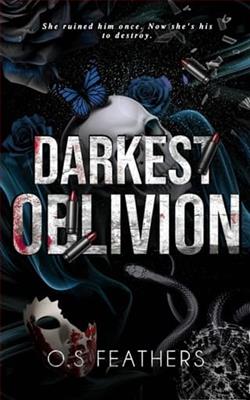Page 11 of Corrupting his Duchess
Gretchen’s was more precise, if wary. Sophia, for her part, gave her brother a small smile, but said nothing.
She hesitated. “Alone?”
He looked at the ladies beside her pointedly and raised a brow, just slightly. The corner of his mouth tilting in something close to a smirk.
“If you're worried about propriety, I imagine your current company more than sufficient,” he said, voice bone-dry. “But ifyou’d prefer a chaperone, I could summon your cousin, though I warn you, his commentary on maritime investments might ruin the view.”
“I'd rather not,” she said.
Behind her, Gretchen gave a soft breath—almost a sigh—and linked her arm lightly through Anna’s.
“We shall accompany you, of course,” she said coolly, glancing at the Duke with a composed smile.
Julia leaned toward Sophia with a whisper that carried just enough. “Do you suppose we’ll need smelling salts?”
Sophia murmured something in return—dry, amused—but remained a step behind.
Anna returned her gaze to Henry. She arched her brow.
Henry’s jaw ticked. Whether from irritation or amusement, Anna couldn’t quite tell.
He offered her his arm again. “Shall we?”
Anna sighed—whether at herself or at all of them, she didn’t know—and took it.
The others followed at a discreet distance, skirts rustling faintly in the corridor, their presence both chaperoning and conspiring.
They walked the garden path in silence at first, boots crunching softly over gravel, the wind lifting the edge of Anna’s cloak. The path curved along the edge of a trimmed lawn, bordered by bare rose bushes and almost frostbitten hedges. The estate loomed behind them, still imposing.
Sophia, Julia, and Gretchen had begun the stroll with them, but had gradually slowed their pace, pausing now and then to admire ivy-covered trellises and remark on long-forgotten statuary. The path was winding enough—and the hedges high enough—that they were no longer in sight, though their soft voices still drifted faintly on the breeze.
They passed the sundial, its stone face crusted with frost.
She cleared her throat. “You’ve not offered pleasantries. No polite comments on the weather. Not even a compliment about…my hat.”
“It’s a very respectable hat,” he said blandly.
She gave him a look and shook her head. “You’re terrible at this.”
“At what?”
“Conversation.”
“I know.”
He didn’t say anything anymore and she let the silence linger a little longer before speaking again, more quietly this time.
“I’ve learned not to speak too freely in mixed company. My… ruminations have a way of unsettling people.”
He didn’t respond right away, but she felt his gaze sharpen, not with judgment—but curiosity.
“Isaac doesn’t seem fond of them,” he said, voice low. “Your thoughts.”
She blinked. That wasn’t a question—it was an observation. A correct one.
“Ideas,” she continued, more cautiously now “have a way of making me inconvenient. And it becomes tedious, always having to soften the edges of my thoughts to make them digestible.”
She looked ahead again, voice cool but distant. “It’s easier not to bother. I’ve no desire to explain myself every time I open my mouth.”















